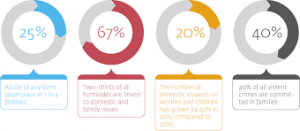Old Russian proverb: “If he beats you it means he loves you.”
This week’s case will take us to Russia where a debate is currently occurring over the legality and the humanity of decriminalizing domestic violence, and specifically domestic violence that is more geared toward women and children.
Russia is the largest nation, by territory, in the world covering the majority of two continents and northern Eurasia. With a population of 142 million people and over 150 different ethnic groups living within Russia’s borders, it is understandable that you cannot please every citizen under one legislation. But in regards to the topic of domestic violence, it should not be decriminalized, but President Putin has expressed his support for the bill and as of January 27th 2017 the bill was accepted in a 308 for 3 against vote.
Before its passage the bill had been presented two times and explicitly asked to decriminalize certain forms of domestic violence within Russia. Deputy Director for Campaigns in Russia from Amnesty International, an international non-profit focused on international law and rights based out of London, stated that domestic violence has never been a “hot topic” in the Russian legislature, mostly because many citizens find that varying levels of violence is permitted, at least within the family setting. Most victims are hopeless that anything will be done because given that this bill will most likely be written into law with a signature from Putin, law enforcement will do less than they have been for victims of domestic violence. Many officers take the standpoint that they should not interfere within the family dynamic because many Russian citizens believe that all family affairs should be dealt with in house in whatever way they wish.
The bill, bluntly labeled as the “slapping bill,” has been asked to be amended numerous times. One amendment would still hold offenders accountable for their actions, at least in cases involving minors, pregnant women, and others under distressing circumstances. Regardless, the bill now legally allows forms of domestic violence that does not cause “substantial bodily harm” and does not occur on a routine basis. The only punishment that could be incurred for a charge of domestic violence would be either a 500$ fine or a 15-day prison stay. The passage of this bill overturned a ruling from the Supreme Court last year that decriminalized battery, but had kept the law that allowed offenders to be charged in a court of law, now they will not. The Kremlin sees this new bill as progress and as a way to correct their mistake from the past year of allowing charges to be filed in domestic abuse cases.
The interior ministry in Russia reports that 40% of all violent crimes are committed within the family and that every year 36,000 women and 26,000 children are beaten by someone they know or live with, and 14,000 women a year die from domestic abuse; many believe these statistics actually underrepresent the level of abuse occurring in Russia. Alyona Popova, a women’s right advocate, stated that “traditional, or rather archaic values have become popular again.” Even the Russian Orthodox Church supports the passage of this bill stating that “if reasonable and carried out with love, corporal punishment is an essential right given to parents by God.” These beliefs are so ingrained in the history of Russia that it will be hard to generate true change.
In the past ten years, the UN has compiled a series of reports about women’s rights and the status of abuse in Russia. In the original documents there was discussion of creating separate legislation to help abused citizens and to create women’s shelters; very few of these ideas have been implemented. Russia has also not yet adopted a domestic violence law or ratified the Council of Europe Convention on preventing and combating violence against women and domestic violence that was created in 2014.
Clearly there is a need for dramatic legal action to take place in Russia on the issue of domestic abuse; we cannot let women, children, and citizens be beaten and have their attackers go unpunished. Here, in the U.S., we are thankful to have a system where crimes like these almost always do not go unpunished, but that is not to say that we have a perfect judicial system.
Quick Facts:
25% of families in Russia experience some form of abuse
67% of homicides are related to domestic and family issues
20% increase in domestic assaults on children and women from 2010-2015
40% of all violent crimes are committed within the family setting
Links:
http://www.amnestyusa.org/news/press-releases/russia-lawmakers-must-halt-alarming-plans-to-decriminalize-domestic-violence
http://www.usatoday.com/story/news/2017/01/27/russian-parliament-decrimiinalizes-domestic-violence/97129912/
http://www.amnestyusa.org/our-work/countries/europe/russian-federationhttps://themoscowtimes.com/articles/if-he-beats-you-it-means-he-loves-you-54866



